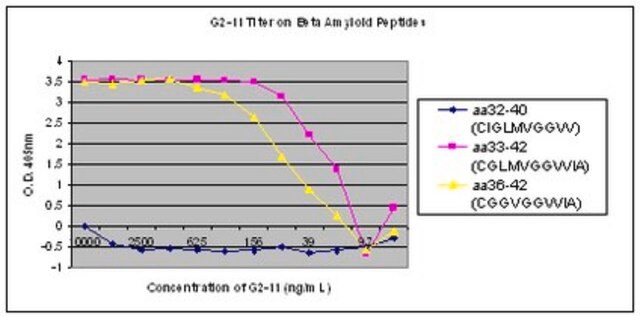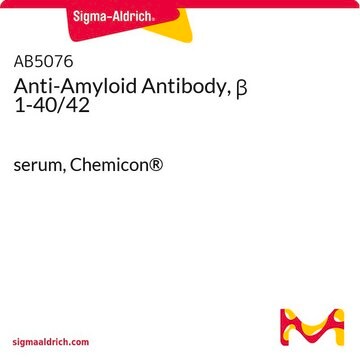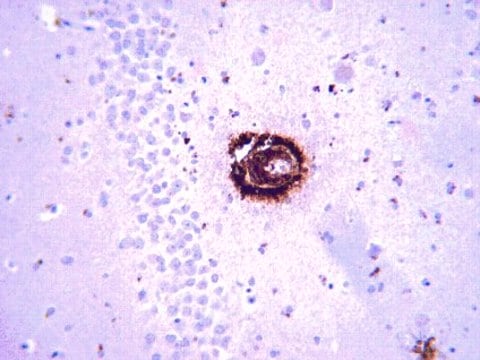MABN13
Anti-Amyloid β42 Antibody, clone G2-13
clone G2-13, from mouse
Synonym(s):
Alzheimer disease, Alzheimer disease amyloid protein, Cerebral vascular amyloid peptide, Protease nexin-II, amyloid beta (A4) precursor protein, amyloid beta A4 protein, amyloid beta precursor protein, beta-amyloid peptide, human mRNA for amyloid A4 prec
About This Item
IHC
WB
immunohistochemistry: suitable
western blot: suitable
Recommended Products
biological source
mouse
Quality Level
antibody form
purified antibody
clone
G2-13, monoclonal
species reactivity
human
species reactivity (predicted by homology)
mouse (based on 100% sequence homology)
technique(s)
ELISA: suitable
immunohistochemistry: suitable
western blot: suitable
isotype
IgG1κ
NCBI accession no.
UniProt accession no.
shipped in
wet ice
target post-translational modification
unmodified
Gene Information
human ... APP(351)
General description
Specificity
Immunogen
Application
ELISA: A representative lot of MABN12 antibody was used in a titer ELISA. Specificity of detection for Amyloid beta peptides is displayed below.
ELISA:
Neuroscience
Neurodegenerative Diseases
Quality
Western Blot Analysis: 1 µg/ml of this antibody detected Amyloid β42 in 10 µg of human Alzheimer diseased brain tissue lysate.
Target description
Physical form
Storage and Stability
Analysis Note
Human Alzheimer diseased brain tissue lysate
Other Notes
Disclaimer
Storage Class Code
12 - Non Combustible Liquids
WGK
WGK 2
Flash Point(F)
Not applicable
Flash Point(C)
Not applicable
Certificates of Analysis (COA)
Search for Certificates of Analysis (COA) by entering the products Lot/Batch Number. Lot and Batch Numbers can be found on a product’s label following the words ‘Lot’ or ‘Batch’.
Already Own This Product?
Find documentation for the products that you have recently purchased in the Document Library.
Our team of scientists has experience in all areas of research including Life Science, Material Science, Chemical Synthesis, Chromatography, Analytical and many others.
Contact Technical Service








